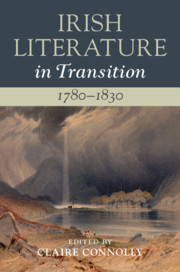Book contents
- Irish Literature in Transition, 1780–1830
- Irish Literature in Transition
- Irish Literature in Transition, 1780–1830
- Copyright page
- Contents
- Contributors
- Series Preface
- General Acknowledgements
- Acknowledgements
- Introduction
- Part I Origins
- Part II Transitions
- Part III Reputations
- Part IV Futures
- Chapter 17 ‘My country takes her place among the nations of the earth’: Ireland and the British Archipelago in the Age of the Union
- Chapter 18 Mentalities in Transition: Irish Romanticism in European Context
- Chapter 19 Ireland and Empire: Popular Fiction in the Wake of the Union
- Chapter 20 Transatlantic Influences and Futures
- Chapter 21 The Literary Legacies of Irish Romanticism
- Index
Chapter 17 - ‘My country takes her place among the nations of the earth’: Ireland and the British Archipelago in the Age of the Union
from Part IV - Futures
Published online by Cambridge University Press: 28 February 2020
- Irish Literature in Transition, 1780–1830
- Irish Literature in Transition
- Irish Literature in Transition, 1780–1830
- Copyright page
- Contents
- Contributors
- Series Preface
- General Acknowledgements
- Acknowledgements
- Introduction
- Part I Origins
- Part II Transitions
- Part III Reputations
- Part IV Futures
- Chapter 17 ‘My country takes her place among the nations of the earth’: Ireland and the British Archipelago in the Age of the Union
- Chapter 18 Mentalities in Transition: Irish Romanticism in European Context
- Chapter 19 Ireland and Empire: Popular Fiction in the Wake of the Union
- Chapter 20 Transatlantic Influences and Futures
- Chapter 21 The Literary Legacies of Irish Romanticism
- Index
Summary
This chapter examines the relationship between Irish Anglophone literature and Anglophone literatures elsewhere in the British Isles in the era of Union. The prominence of Irish literature in the creation of cultural memory which presented complex and remote events in simple terms – particularly accessible and portable to the diaspora, who aligned the language of deprivation and struggle with their own experiences of famine and poverty – is understood as a central part of this process. In historicising Irish literature in English in the romantic era, this chapter challenges the overlaid interpretations of Irish nationalist cultural memory in querying if it makes sense to speak of a distinct Anglophone Irish literature in English and a distinct Irish cultural and social history in this period, asking in what Irish claims to distinctiveness rested at the time. It concludes that we need to understand Irish culture and literature in more archipelagic and intercultural terms, and that the politics of the Union era themselves and Ireland’s exposure to the allegedly ‘enlightened’ and ‘universal’ norms of British imperial administration served to crystallise the memorialisation of Irish difference which in the end came to underpin the concept of a separate Irish Anglophone culture and literature.
Keywords
- Type
- Chapter
- Information
- Irish Literature in Transition, 1780–1830 , pp. 323 - 341Publisher: Cambridge University PressPrint publication year: 2020

